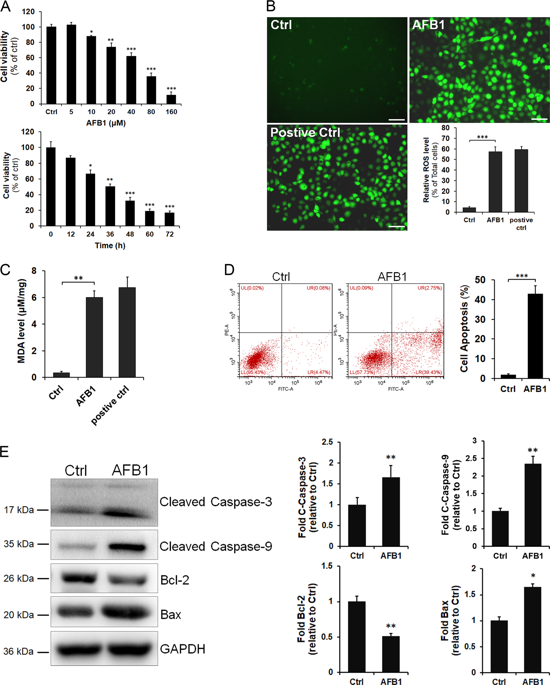当前位置:
X-MOL 学术
›
Cell Death Dis.
›
论文详情
Our official English website, www.x-mol.net, welcomes your feedback! (Note: you will need to create a separate account there.)
Critical role of caveolin-1 in aflatoxin B1-induced hepatotoxicity via the regulation of oxidation and autophagy.
Cell Death & Disease ( IF 9 ) Pub Date : 2020-01-02 , DOI: 10.1038/s41419-019-2197-6 Qingqiang Xu 1 , Wenwen Shi 1 , Pan Lv 1 , Wenqi Meng 1 , Guanchao Mao 1 , Chuchu Gong 1 , Yongchun Chen 1 , Youheng Wei 2 , Xiaowen He 3 , Jie Zhao 1 , Hua Han 4 , Mingxue Sun 1 , Kai Xiao 1
Cell Death & Disease ( IF 9 ) Pub Date : 2020-01-02 , DOI: 10.1038/s41419-019-2197-6 Qingqiang Xu 1 , Wenwen Shi 1 , Pan Lv 1 , Wenqi Meng 1 , Guanchao Mao 1 , Chuchu Gong 1 , Yongchun Chen 1 , Youheng Wei 2 , Xiaowen He 3 , Jie Zhao 1 , Hua Han 4 , Mingxue Sun 1 , Kai Xiao 1
Affiliation

|
Aflatoxin B1 (AFB1) is a potent hepatocarcinogen in humans and exposure to AFB1 is known to cause both acute and chronic hepatocellular injury. As the liver is known to be the main target organ of aflatoxin, it is important to identify the key molecules that participate in AFB1-induced hepatotoxicity and to investigate their underlying mechanisms. In this study, the critical role of caveolin-1 in AFB1-induced hepatic cell apoptosis was examined. We found a decrease in cell viability and an increase in oxidation and apoptosis in human hepatocyte L02 cells after AFB1 exposure. In addition, the intracellular expression of caveolin-1 was increased in response to AFB1 treatment. Downregulation of caveolin-1 significantly alleviated AFB1-induced apoptosis and decreased cell viability, whereas overexpression of caveolin-1 reversed these effects. Further functional analysis showed that caveolin-1 participates in AFB1-induced oxidative stress through its interaction with Nrf2, leading to the downregulation of cellular antioxidant enzymes and the promotion of oxidative stress-induced apoptosis. In addition, caveolin-1 was found to regulate AFB1-induced autophagy. This finding was supported by the effect that caveolin-1 deficiency promoted autophagy after AFB1 treatment, leading to the inhibition of apoptosis, whereas overexpression of caveolin-1 inhibited autophagy and accelerated apoptosis. Interestingly, further investigation showed that caveolin-1 participates in AFB1-induced autophagy by regulating the EGFR/PI3K-AKT/mTOR signaling pathway. Taken together, our data reveal that caveolin-1 plays a crucial role in AFB1-induced hepatic cell apoptosis via the regulation of oxidation and autophagy, which provides a potential target for the development of novel treatments to combat AFB1 hepatotoxicity.
中文翻译:

通过调节氧化和自噬,caveolin-1在黄曲霉毒素B1诱导的肝毒性中的关键作用。
黄曲霉毒素B1(AFB1)是人类有效的肝致癌物,已知暴露于AFB1会引起急性和慢性肝细胞损伤。由于已知肝脏是黄曲霉毒素的主要靶器官,因此重要的是确定参与AFB1诱导的肝毒性的关键分子并研究其潜在机制。在这项研究中,研究了caveolin-1在AFB1诱导的肝细胞凋亡中的关键作用。我们发现AFB1暴露后,人类肝细胞L02细胞的细胞活力下降,氧化和凋亡增加。另外,响应AFB1处理,小窝蛋白1的细胞内表达增加。Caveolin-1的下调显着减轻了AFB1诱导的细胞凋亡并降低了细胞活力,而Caveolin-1的过表达逆转了这些作用。进一步的功能分析表明,caveolin-1通过与Nrf2相互作用而参与AFB1诱导的氧化应激,从而导致细胞抗氧化酶的下调并促进了氧化应激诱导的细胞凋亡。另外,发现caveolin-1调节AFB1诱导的自噬。这一发现得到了以下事实的支持:cafolin-1缺乏会在AFB1处理后促进自噬,从而导致凋亡的抑制,而caveolin-1的过表达抑制自噬并加速凋亡。有趣的是,进一步的研究表明,caveolin-1通过调节EGFR / PI3K-AKT / mTOR信号通路参与了AFB1诱导的自噬。在一起
更新日期:2020-01-09
中文翻译:

通过调节氧化和自噬,caveolin-1在黄曲霉毒素B1诱导的肝毒性中的关键作用。
黄曲霉毒素B1(AFB1)是人类有效的肝致癌物,已知暴露于AFB1会引起急性和慢性肝细胞损伤。由于已知肝脏是黄曲霉毒素的主要靶器官,因此重要的是确定参与AFB1诱导的肝毒性的关键分子并研究其潜在机制。在这项研究中,研究了caveolin-1在AFB1诱导的肝细胞凋亡中的关键作用。我们发现AFB1暴露后,人类肝细胞L02细胞的细胞活力下降,氧化和凋亡增加。另外,响应AFB1处理,小窝蛋白1的细胞内表达增加。Caveolin-1的下调显着减轻了AFB1诱导的细胞凋亡并降低了细胞活力,而Caveolin-1的过表达逆转了这些作用。进一步的功能分析表明,caveolin-1通过与Nrf2相互作用而参与AFB1诱导的氧化应激,从而导致细胞抗氧化酶的下调并促进了氧化应激诱导的细胞凋亡。另外,发现caveolin-1调节AFB1诱导的自噬。这一发现得到了以下事实的支持:cafolin-1缺乏会在AFB1处理后促进自噬,从而导致凋亡的抑制,而caveolin-1的过表达抑制自噬并加速凋亡。有趣的是,进一步的研究表明,caveolin-1通过调节EGFR / PI3K-AKT / mTOR信号通路参与了AFB1诱导的自噬。在一起


























 京公网安备 11010802027423号
京公网安备 11010802027423号